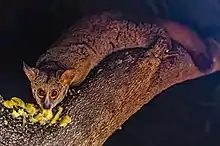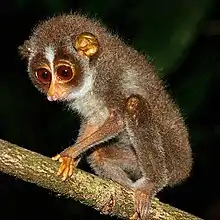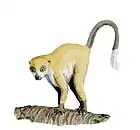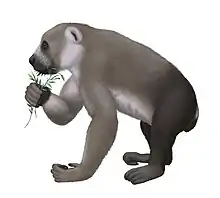Lorisoidea
Lorisoidea is a superfamily of nocturnal primates found throughout Africa and Asia. Members include the galagos and the lorisids.[2]: 34–35 As strepsirrhines, lorisoids are related to the lemurs of Madagascar and are sometimes included in the infraorder Lemuriformes,[3][lower-alpha 1] although they are also sometimes placed in their own infraorder, Lorisiformes Gregory, 1915.[2]: 38
| Lorisiformes[1] Temporal range: | |
|---|---|
 | |
| Brown greater galago, Otolemur crassicaudatus | |
| Scientific classification | |
| Domain: | Eukaryota |
| Kingdom: | Animalia |
| Phylum: | Chordata |
| Class: | Mammalia |
| Order: | Primates |
| Suborder: | Strepsirrhini |
| Infraorder: | Lemuriformes [lower-alpha 1] |
| Superfamily: | Lorisoidea Gray 1821 |
| Families | |
Classification
- Order Primates
- Suborder Strepsirrhini
- Infraorder †Adapiformes
- Infraorder Lemuriformes[lower-alpha 1]
- Superfamily Lemuroidea: lemurs
- Superfamily Lorisoidea
- Suborder Haplorhini: tarsiers, monkeys, and apes
- Suborder Strepsirrhini

Red slender loris, Loris tardigradus
Notes
- The monophyletic clade containing the lemurs and lorisoids is widely accepted, but the name to be used for the clade is not yet agreed upon. The term Lemuriformes is used here since it derives from one popular taxonomy that clumps the clade of toothcombed primates into one infraorder and the extinct, non-toothcombed adapiforms into another, both within the suborder Strepsirrhini.[4][5] However, a popular alternative taxonomy places the lorisoids in their own infraorder, Lorisiformes.[6]: 20–21
References
- Groves, C. P. (2005). "Order Primates". In Wilson, D. E.; Reeder, D. M (eds.). Mammal Species of the World: A Taxonomic and Geographic Reference (3rd ed.). Johns Hopkins University Press. pp. 121–127. ISBN 978-0-8018-8221-0. OCLC 62265494.
- Nekaris, N.A.I.; Bearder, S.K. (2011). "Chapter 4: The lorisiform primates of Asia and mainland Africa: Diversity shrouded in darkness". In Campbell, C.J.; Fuentes, A.; MacKinnon, K.C.; Bearder, S. K.; Stumpf, R.M. (eds.). Primates in Perspective (2nd ed.). Oxford University Press. ISBN 978-0-19-539043-8.
- Cartmill, M.; Smith, F.H. (2011). The Human Lineage. John Wiley & Sons. p. 90. ISBN 978-1-118-21145-8.
- Szalay, F.S.; Delson, E. (1980). Evolutionary History of the Primates. Academic Press. p. 149. ISBN 978-0126801507. OCLC 893740473.
- Cartmill, M. (2010). "Primate Classification and Diversity". In Platt, M.; Ghazanfar, A. (eds.). Primate Neuroethology. Oxford University Press. pp. 10–30, esp. p. 15. ISBN 978-0-19-532659-8.
- Hartwig, W. (2011). "Chapter 3: Primate evolution". In Campbell, C. J.; Fuentes, A.; MacKinnon, K. C.; Bearder, S. K.; Stumpf, R. M (eds.). Primates in Perspective (2nd ed.). Oxford University Press. pp. 19–31. ISBN 978-0-19-539043-8.
 Data related to Lorisoidea at Wikispecies
Data related to Lorisoidea at Wikispecies
This article is issued from Wikipedia. The text is licensed under Creative Commons - Attribution - Sharealike. Additional terms may apply for the media files.

